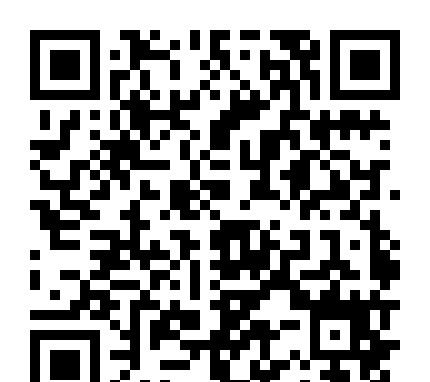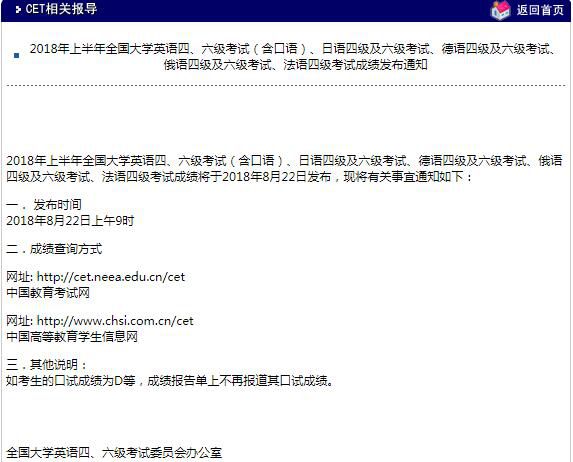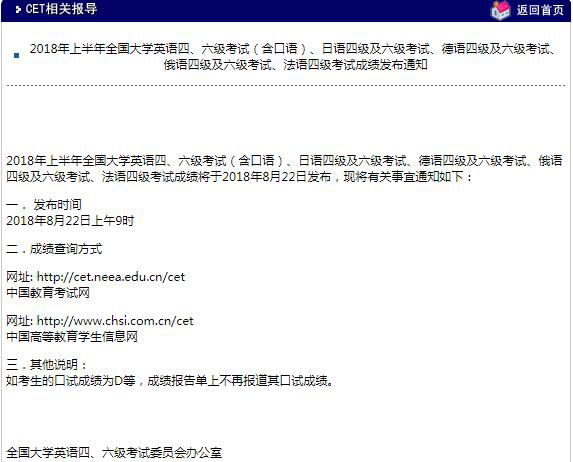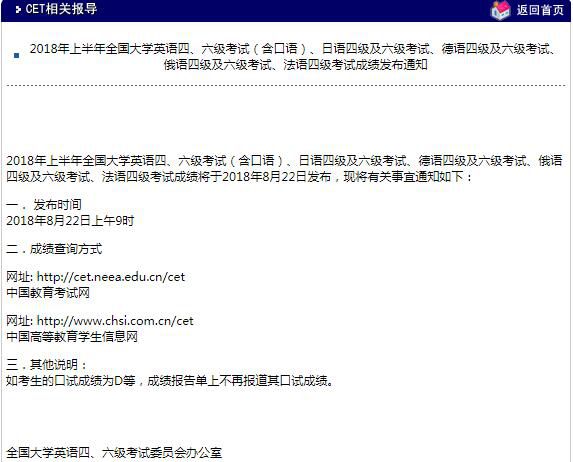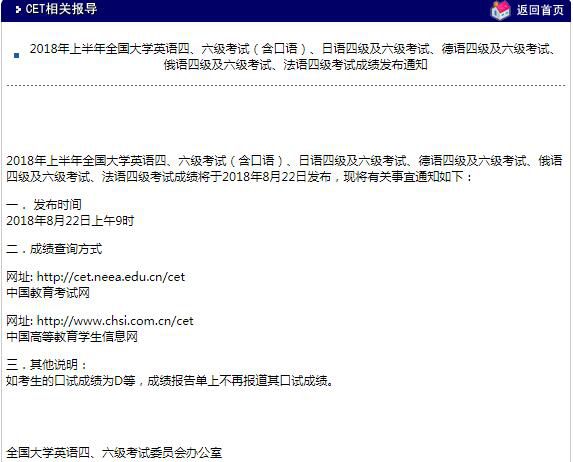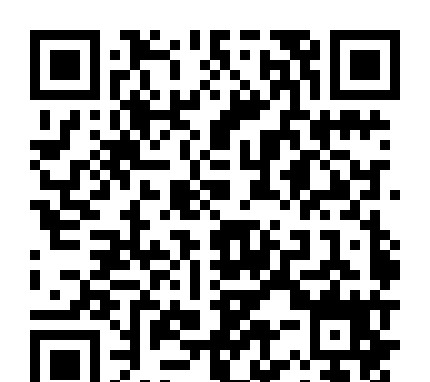题库-2000年1月大学英语六级考试试题及参考答案
|
PartⅠ Listening Comprehension (20 minutes) Section A Directions: In this section, you will hear 10 short conversations. At the end of each conversation, a question will be asked about what was said. Both the conversation and the question will be spoken only once. After each question there will be a pause. During (he pause, you must read the four choices marked A), B), C) and D), and decide which is the best answer. Then mark the corresponding letter on the Answer Sheet with a single line through the centre. Example: You will hear: You will read: A) 2 hours. B) 3 hours. C) 4 hours. D) 5 hours. From the conversation we know that the two are talking about some work they will start at 9 o'clock in the morning and have to finish at 2 in the afternoon. Therefore. D) “5 hours”is the correct answer. You should choose [D] on the Answer Sheet and mark it with a single line trough the centre. Sample Answer [A][B][C][D] 1. A) To cancel his trip. B) To go to bed early. C) To catch a later flight. D) To ask for a wake - up call. 2. A) They have different opinions as to what to do next. B) They have to pay for the house by installments. C) They will fix a telephone in the bathroom. D) The man's attitude is more sensible than the woman's. 3. A) She will save the stamps for the man's sister. B) She will no longer get letters from Canada. C) She can't give the stamps to the man's sister. D) She has given the stamps to the man's roommates. 4. A) Visiting the Brownings. B) Writing a postcard. C) Looking for a postcard. D) Filling in a form. 5. A) The man should work with somebody else. B) The man should meet his partner's needs. C) They should come to a compromise. D) They should find a better lab for the project. 6. A) She can't finish her assignment, either. B) She can't afford a computer right now. C) The man can use her computer. D) The man should buy a computer right away. 7. A) The visiting economist has given several lectures. B) The guest lecturer's opinion is different from Dr. Johnson's. C) Dr. Johnson and the guest speaker were schoolmates. D) Dr. Johnson invited the economist to visit their college. 8. A) She's never watched a better game. B) Football is - her favorite pastime. C) The game has been canceled. D) Their team played very badly. 9. A) The man should stick to what he's doing. B) The man should take up a new hobby. C) The man should stop playing tennis. D) The man should find the cause for his failure. 10. A) An invented story. B) A real life experience. C) An imaginary situation. D) A terrible nightmare. Section B Directions: In this section, you will hear 3 short passages. At the end of each passage, you will hear some questions. Both the passage and the questions will be spoken only once. After you hear a question, you must choose the best answer from the four choices marked A), B), C) and D). Then mark the corresponding letter on the Answer Sheet with a single line through the centre. Passage 1 Questions 11 to 13 are based on the passage you have just heard. 11.A) The name of a German town; B) A resident of Frankfurt. C) A kind of German sausage. D) A kind of German bread. 12.A) He sold fast food. B) He raised dogs. C) He was A cook. D) He was a Cartoonist. 13.A) Because the Americans found they were from Germany. B) Because people thought they contained dog meat. C) Because people had to get used to their taste. D) Because it was too hot to eat right away. Passage 2 Questions 14 to 16 are based on the passage you have just heard. 14.A) They give out faint cries. B) They make noises to drive away insects. C) They extend their water pipes D) They become elastic like rubber bands. 15.A) Quiet plants. B) Well - watered plants. C) Healthy plants. D) Thirsty plants. 16.A) They could drive the insects away. B) They could keep the plants well - watered. C) They could make the plants grow faster. D) They could build devices to trap insects. Passage 3 Questions 17 to 20 are based on the passage you have just heard. 17.A) To look for a different lifestyle. B) To enjoy themselves. C) For adventure. D) For education. 18.A) There are 200 vehicles for every kilometer of roadway. B) It has a dense population. C) There are many museums and palaces. D) It has many towering buildings. 19.A) It is a city of contrasts. B) It possesses many historical sites. C) It is an important industrial center. D) It has many big and beautiful parks. 20.A) It helps develop our personalities. B) It enables us to acquire first - hand knowledge. C) It makes our life more interesting. D) It brings about changes in our lifestyle. PartⅡ Reading Comprehension (35 minutes) Directions: There are 4 reading passages in this part. Each passage is followed by some questions or unfinished statements. For each of them there are four choices marked A), B), C) and D). You should decide on the best choice and mark the corresponding letter on the Answer Sheet with a single line trough the centre. Questions 21 to 25 are based on the following passage: In the world of entertainment, TV talk shows have undoubtedly flooded every inch of space on daytime television. And anyone who watches them regularly knows that each one varies in style and format. But no two shows are more profoundly opposite in content, while at the same time standing out above the rest, than the Jerry Springer and the Oprah Winfrey shows. Jerry Springer could easily be considered the king of "trash talk(废话)". The topics on his show are as shocking as shocking can be. For example, the show takes the ever - common talk show themes of love, sex, cheating, guilt, hate, conflict and morality to a different level. Clearly, the Jerry Springer show is a display and exploitation of society's moral catastrophes (灾难),yet people are willing to eat up the intriguing predicaments(困境) of other people's lives. Like Jerry Springer, Oprah Winfrey takes TV talk show to its extreme, but Oprah goes in the opposite direction. The show focuses on the improvement of society and an individual's quality of life. Topics range from teaching your children responsibility, managing your work week, to getting to know your neighbors. Compared to Oprah, the Jerry Springer show looks like poisonous waste being dumped on society. Jerry ends every show with a “final word”. He makes a small speech that sums up the entire moral of the show. Hopefully, this is the part where most people will learn something very valuable. Clean as it is, the Oprah show is not for everyone. The show's main target audience are middle - class Americans. Most of these people have the time. money, and stability to deal with life's tougher problems. Jerry Springer, on the other hand, has more of an association with the young adults of society. These are 18 - to 21 - year - olds whose main troubles in life involve love, relationship, sex, money and peers. They are the ones who see some value and lessons to be learned underneath the show's exploitation. While the two shows are as different as night and day. both have ruled the talk show circuit for many years now. Each one caters to a different audience while both have a strong following from large groups of fans. Ironically, both could also be considered pioneers in the talk show world. 21.Compared with other TV talk shows, both the Jerry Springer and the Oprah Winfrey are______. A) more family - oriented B) unusually popular C) more profound D) relatively formal 22.Though the social problems Jerry Springer talks about appear distasteful, the audience______. A) remain fascinated by them B) are ready to face up to them C) remain indifferent to them D) are willing to get involved in them 23.Which of the following is likely to be a topic of the Oprah Winfrey show? A) A new type of robot. B) Racist hatred. C) Family budget planning. D) Street violence. 24.Despite their different approaches, the two talk shows are both________. A) ironical B) sensitive C) instructive D) cynical 25.We can learn from the passage that the two talk shows_______. A) have monopolized the talk show circuit B) exploit the weaknesses in human nature C) appear at different times of the day D) are targeted at different audiences Questions 26 to 30 are based on the following passage: To understand the marketing concept, it is only necessary to understand the difference between marketing and selling. Not too many years ago, most industries concentrated primarily on the efficient production of goods, and then relied on "persuasive salesmanship" to move as much of these goods as possible. Such production and selling focuses on the needs of the seller to produce goods and then convert them into money. Marketing, on the other hand, focuses on the wants of consumers. It begins with first analyzing the preferences and demands of consumers and then producing goods that will satisfy them. This eye - on - the - consumer approach is known as the marketing concept, which simply means that instead of trying to sell whatever is easiest to produce or buy for resale, the makers and dealers first endeavor to find out what the consumer wants to buy and then go about making it available for purchase. This concept does not imply that business is benevolent(慈善的)or that consumer satisfaction is given priority over profit in a company. There are always two sides to every business transaction - the firm and the customer -and each must be satisfied before trade occurs. Successful merchants and producers, however, recognize that the surest route to profit is through understanding and catering to customers. A striking example of the importance of catering to the consumer presented itself in mid - 1985, when Coca Cola changed the flavor of its drink. The non - acceptance of the new flavor by a significant portion of the public brought about a prompt restoration of the Classic Coke, which was then marketed alongside the new. King Customer ruled! 26.The marketing concept discussed in the passage is, in essence,_______. A) the practice of turning goods into money B) making goods available for purchase C) the customer - centred approach D) a form of persuasive salesmanship 27.What was the main concern of industrialists before the marketing concept was widely accepted? A) The needs of the market. B) The efficiency of production. C) The satisfaction of the user. D) The preferences of the dealer. 28.According to the passage, “to move as much of these goods as possible” (Lines 3 -4 ), Para. I) means “_______”. A) to sell the largest possible amount of goods B) to transport goods as efficiently as possible C) to dispose of these goods in large quantities D) to redesign these goods for large - scale production 29.What does the restoration of the Classic Coke best illustrate? A) Traditional goods have a stronger appeal to the majority of people. B) It takes time for a new product to be accepted by the public. C) Consumers with conservative tastes are often difficult to please. D) Products must be designed to suit the taste of the consumer. 30.In discussing the marketing concept, the author focuses on_______. A) its main characteristic B) its social impact C) its possible consequence D) its theoretical basis Questions 31 to 35 are based on the following passage: Conventional wisdom about conflict seems pretty much cut and dried. Too little conflict breeds apathy (冷漠) and stagnation (呆滞). Too much conflict leads to divisiveness (分裂) and hostility. Moderate levels of conflict, however, can spark creativity and motivate people in a healthy and competitive way. Recent research by Professor Charles R. Schwenk, however, suggests that the optimal level of conflict may be more complex to determine than these simple generalizations. He studied perceptions of conflict among a sample of executives. Some of the executives worked for profit-seeking organizations and others for not - for - profit organizations. Somewhat surprisingly, Schwenk found that opinions about conflict varied systematically as a function of the type of organization. Specifically, managers in not - for - profit organizations strongly believed that conflict was beneficial to their organizations and that it promoted higher quality decision making than might be achieved in the absence of conflict. Managers of for - profit organizations saw a different picture. They believed that conflict generally was damaging and usually led to poor - quality decision making in their organizations. Schwenk interpreted these results in terms of the criteria for effective decision making suggested by the executives. In the profit - seeking organizations, decision - making effectiveness was most often assessed in financial terms. The executives believed that consensus rather than conflict enhanced financial indicators. In the not - for - profit organizations, decision - making effectiveness was defined from the perspective of satisfying constituents. Given the complexities and ambiguities associated with satisfying many diverse constituents executives perceived that conflict led to more considered and acceptable decisions. 31.In the eyes of the author, conventional opinion on conflict is________. A) wrong B) oversimplified C) misleading D) unclear 32.Professor Charles R. Schwenk's research shows________. A) the advantages and disadvantages of conflict B) the real value of conflict C) the difficulty in determining the optimal level of conflict D) the complexity of defining the roles of conflict 33.We can learn from Schwenk's research that________. A) a person1s view of conflict is influenced by the purpose of his organization B) conflict is necessary for managers of for - profit organizations C) different people resolve conflicts in different ways D) it is impossible for people to avoid conflict 34.The passage suggests that in for - profit organizations_______. A) there is no end of conflict B) expression of different opinions is encouraged C) decisions must be justifiable D) success lies in general agreement 35.People working in a not - for - profit organization________. A) seem to be difficult to satisfy B) are free to express diverse opinions C) are less effective in making decisions D) find it easier to reach agreement Questions 36 to 40 are based on the following passage: Imagine eating everything delicious you want - with none of the fat. That would be great, wouldn't it? New “fake fat” products appeared on store shelves in the United States recently, but not everyone is happy about it. Makers of the products, which contain a compound called olestra, say food manufacturers can now eliminate fat from certain foods. Critics, however, say the new compound can rob the body of essential vitamins and nutrients (营养物) and can also cause unpleasant side effects in some people. So it's up to decide whether the new fat-free products taste good enough to keep eating. Chemists discovered olestra in the late 1960s, when they were searching for a fat that could be digested by infants more easily. Instead of finding the desired fat, the researchers created a fat that can't be digested at all. Normally, special chemicals in the intestines (肠)“grab” molecules of regular fat and break them down so they can be used by the body. A molecule of regular fat is made up of three molecule of substances called fatty acids. The fatty acids are absorbed by the intestines and bring with them the essential vitamins A, D, E, and K. When fat molecules are present in the intestines with any of those vitamins, the vitamins attach to the molecules and are carried into the bloodstream. Olestra, which is made from six to eight molecules of fatty acids, is too large for the intestines to absorb. It just slides through the intestines without being broken down. Manufacturers say it's that ability to slide unchanged through the intestines that makes olestra so valuable as a fat substitute. It provides consumers with the taste of regular fat without any bad effects on the body. But critics say olestra can prevent vitamins A, D, E, and K from being absorbed. It can also prevent the absorption of carotenoids (类胡萝卜素), compounds that may reduce the risk of cancer, heart disease, etc. Manufacturers are adding vitamins A, D, E, and K as well as carotenoids to their products now. Even so, some nutritionists are still concerned that people might eat unlimited amounts of food made with the fat substitute without worrying about how many calories they are consuming. 36. We learn from the passage that olestra is a substance that_______. A) contains plenty of nutrients B) renders foods calorie - free while retaining their vitamins C) makes foods easily digestible D) makes foods fat - free while keeping them delicious 37.The result of the search for an easily digestible fat turned out to be_______. A) commercially useless B) just as anticipated C) somewhat controversial D) quite unexpected 38.Olestra is different from ordinary fats in that_______. A) it passes through the intestines without being absorbed B) it facilitates the absorption of vitamins by the body C) it helps reduce the incidence of heart disease D) it prevents excessive intake of vitamins 39.What is a possible negative effect of olesira according to some critics? A) It may impair the digestive system. B) It may affect the overall fat intake. C) It may increase the risk of cancer. D) It may spoil the consumers' appetite. 40.Why are nutritionists concerned about adding vitamins to olesira? A) It may lead to the over - consumption of vitamins. B) People may be induced to eat more than is necessary. C) The function of the intestines may be weakened. D) It may trigger a new wave of fake food production. PartⅢ Vocabulary (20 minutes) Directions: There are 30 incomplete sentences in this part. For each sentence th ere are four choices marked A), D), C) and D). Choose the ONE that best complete s the sentence. Then mark the corresponding letter on the Answer Sheet with a si ngle line through the centre. 41.The doctors don't _______ that he will live much longer. A) articulate B) anticipate C) manifest D) monitor 42.I suggest we put the scheme into effect, for it is quite_______. A) eligible B) sustainable C) probable D) feasible 43.The old gentleman was a very ________ looking person, with grey hair and gold spectacles. A) respectful B) respected C) respective D) respectable 44.This book is expected to _______ the best - seller lists. A) promote B) prevail C) dominate D) exemplify 45.That part of the city has long been ________ for its street violence. A) notorious B) responsible C) historical D) illegal 46.Under the guidance of their teacher, the pupils are building a model boat_______ by steam. A) towed B) pressed C) tossed D) propelled 47.Having finished their morning work, the clerks stood up behind their desks, ________themselves. A) expanding B) stretching C) prolonging D) extending 48.England's team, who are now superbly fit, will be doing their best next week to ________ themselves for last year's defeat. A) revive B) retort C) revenge D) remedy 49.If you want to get into that tunnel, you first have to _______ away all the rocks. A) haul B) transfer C) repel D) dispose 50.It took us only a few hours to _______the paper off all four walls. A) shear B) scrape C) stroke D) chip 51.The famous scientist _______his success to hard work. A) imparted B) granted C) ascribed D) acknowledged 52.It is difficult to _______of a plan to end poverty. A) speculate B) conceive C) ponder D) reckon 53.Now the cheers and applause _______in a single sustained roar. A) mingled B) concentrated C) assembled D) permeated 54.Improved consumer confidence is ________ to an economic recovery. A) crucial B) subordinate C) cumulative D) satisfactory 55.Although the body is made up of many different tissues, these tissues are arranged in an _______ and orderly fashion. A) incredible B) intricate C) internal D) initial 56.If you work under a car when repairing it, you often get very_______. A) waxy B) slippery C) sticky D) greasy 57.The damage to his car was_______; therefore, he could repair it himself. A) considerable B) appreciable C) negligible D) invisible 58.My sister is quite _______ and plans to get an M. A. degree within one year. A) aggressive B) enthusiastic C) considerate D) ambitious 59.The manager tried to wave aside these issues as _______ details that would be settled later. A) versatile B) trivial C) preliminary D) alternate 60.His_______was telling him that something was wrong. A) intuition B) hypothesis C) inspiration D) sentiment 61.This book is about how these basic beliefs and values affect important _______ of American life. A) fashions B) frontiers C) facets D) formats 62.Parents often faced the _______ between doing what they felt was good for the development of the child and what they could stand by way of undisciplined noise and destructiveness. A) paradox B) junction C) dilemma D) premise 63.Clark felt that his _______ in one of the most dramatic medical experiments of all time was worth the suffering he underwent. A) apprehension B) appreciation C) presentation D) participation 64.As one of the youngest professors in the university, Miss King is certainly on the ________ of a brilliant career. A) threshold B) edge C) porch D) course 65.The_______lawyer made a great impression on the jury. A) protecting B) guarding C) defending D) shielding 66.Very few people understood his lecture, the subject of which was very_______. A) dim B) obscure C) conspicuous D) intelligible 67.This movie is not ________ for children to see: it contains too much violence and too many love scenes. A) profound B) valid C) decent D) upright 68.The wood was so rotten that, when we pulled, it _______ into fragments. A) broke off B) broke away C) broke through D) broke up 69.The detective and his assistant have begun to _______ the mysterious murder. A) come through B) look into C) make over D) see to 70.Sadly, the Giant Panda is one of the many species now in danger of_______. A) extinction B) migration C) destruction D) extraction 试 卷 二 PartIV Error Correction (15 minutes) Until the very latest moment of his existence, man has been bound to the planet on which he originated and developed. Now he had the capability to leave that planet 71.________ and move out into the universe to those worlds which he has known previously only directly. Men have explored parts of 72.________ the moon, put spaceships in orbit around another planet and possibly within the decade will land into another planet and 73.________ explore it. Can we be too bold as to suggest that we may be 74.________ able to colonize other planet within the not - too - distant 75.________ future ? Some have advocated such a procedure as a solution to the population problem. ship the excess people off to the moon. But we must keep in head the billions of dollars we 76.________ might spend in carrying out the project. To maintain the earth's population at its present level. we would have to blast off into space 7,500 people every hour of every day of the year. Why are we spending so little money on space 77.________ exploration ? Consider the great need for improving many 78.________ aspects of the global environment, one is surely justified in his concern for the money and resources that they are poured 79.________ into the space exploration efforts. But perhaps we should look at both sides of the coin before arriving hasty 80.________ conclusions. PartV Writing (30 minutes) Directions: WT For this part, you are allowed thirty minutes to write a composition on the topic How I Finance my College Education. You should write at least 120 words, and base your composition on the outline (given in Chinese) below: 1.上大学的费用(tuition and fees )可以通过多种途径解决。 2.那种途径适合我(说明理由) How I Finance My College Education 附:2000年1月大学英语六级考试听力材料及参考答案 Section A? 1. M: I hope I won't oversleep. I've simply got to catch the first flight to New York. W: If I were you, I'd request the wake-up call from the hotel reception. Q: What does the woman advise the man to do? 2. M: Next, shouldn't we get a telephone installed in the hall? W: Fixing the shower pipe is far more important.? Q: What do we learn from the conversation?? 3. M: I've noticed that you get letters form Canada from time to time. Would you mind saving the stamps for me? My sister collects them.? W: My roommate already asked for them.? Q: What does the woman imply?? 4. M: What's the matter? You've been sitting there for ages, just staring into space. W: I told the Brownings I'd send them a postcard. Now I don't know what to say. Q: What's the woman doing?? 5. M: My chemistry project is in trouble. My partner and I have totally different ideas about how to proceed.? W: You should try to meet each other halfway.? Q: What does the woman suggest?? 6. M: I'm frustated. We're supposed to do our assignment on the computer, but I have difficulty getting access to the computers in the library.? W: I understand the way you feel. I'm looking forward to the day when I can afford to get my own.? Q: What does the woman mean?? 7. M: The visiting economist is speaking tonight, but Dr. Johnson doesn't seem to think much of him.? W: That's because Dr. Johnson comes from an entirely different school of thought. ?Q: What do we learn from the woman's remark?? 8. M: I'm sorry I missed the football game, but I had a terrible cold.? W: You didn't miss anything. We couldn't have played worse.? Q: What does the woman imply?? 9. M: I think I'm going to give up playing tennis. I lost again today.? W: Just because you lost? It that the reason to quit?? Q: What does the woman imply?? 10.M: Jane, what would you do if you were on vacation overseas and lost all your money and credit cards?? W: Well, I guess I'd probably sell my watch and camera... Or I might get a job as a waitress somewhere till I made enough money to buy a plance ticket to return home. Q: What are they talking about?? Section B? Passage 1? Most people know what a hot dog is. It's a sausage in a roll. But do you know why it's called a hot dog? Well, the long red sausage which goes into a hotdog is called a Frankfurter?. It got its name from the German town Frankfurt. The sausages were very popular, but hot frankfurters were difficult to sell in crowds One man, Harry Stevens, had the job of feeding the crowds in baseball games. He had an idea. Why not put the frankfurters in long, hot bread rolls? This made them easy to sell. The “red hot" had a hot and attractive taste and became very popular. But in 1903, an American cartoonist drew a long German sausage dog in place of the frankfurter so a frankfurter in a roll soon became known as a “hot dog". It was a joke, but some people really thought the sausages contained dog meat. For a while, sales of hotdogs failed, but not for long.? 11. What is a frankfurter?? 12. What was Harry Stevens' job?? 13. Why did sales of hot dogs decrease for some time?? Passage 2? We all scream for water when thirsty, but do you know in very hot, dry weather, plants also make faint sounds — as if they are crying out for help? You see, in a plant's stem there are hundreds of “water pipes" that bring water and minerals from the soil all the way up to the leaves. As the ground turns dry, it becomes harder and harder for the plants to do this.? In severe droughts, plants have to fight to pull out any water available. Scientist Robert winter has found out that when it is really bad their water pipes snap from the tension like rubber bands. When that happens, the whole plant vibrates a little. The snapping pipes make noises ten thousand times more quiet than a whisper.? Robert knows that healthy, well-watered plants are quiet. He also knows that many insects prefer attacking dry plants rather than healthy plants. How do the insects know which are healthy plants and which are not? Robert thinks that the insects may listen for the plants that cry and then they may buzz in to kill.? To test his theory, Robert is using a device that can imitate plant cries. He attaches it to a quiet, healthy plant so the plant sounds thirsty. Then he watches insects to see if they attack more often than usual.? If he is right, scientists could use the insects' ability against them. They could build traps that imitate crying plants. So when the insects buzz in to eat, they won't buzz out. 14. What do plants do when they are thirsty?? 15. What plants do many insects tend to attack?? 16. What could scientists do if Robert's theory proves to be true?? Passage 3? People enjoy taking trips, but what are the reasons they leave home? One reason is for education. People travel because they want to broaden their horizons to learn about other people and other places. They are curious about other cultures. When people are tourists, they get a quick look at different ways of living. Even a short look at another kind of lifestyle is an important lesson. On a trip, a person can learn directly — by visiting museums and historic spots. What does a tourist learn who sees the art museums, visits the historical palaces and other scenic spots in Paris, and shops along the River Seine? he gets a vivid picture— a real-life—one of the French people. He learns about their attitudes, how they feel about business, beauty and history.? What about the tourist who goes to Hongkong? Does he get the same information that he could get from a book? he might read that Hongkong is crowded, that there is less than 200 square meters of space for each person, but seeing and feeling the lack of space will impress him much more. He might read that there are nearly 200 vehicles for every kilometer of roadway, but the sight of so many vehicles parked along the roadside will be a much more vivid lesson. the tourist to Hongkong will never forget the contrasts — the straight vertical lines of the tall modern buildings and the moving lines of boats that people live in.? 17. Why do people leave home to travel according to the passage?? 18. What do we learn from the passage about Paris?? 19. What impression will a tourist get of Hongkong?? 20. What does the passage tell us about travelling?? 2000年1月大学英语六级考试答案? Part I Listening Comprehension 1. D 2. A 3. C 4. B 5. C 6. B 7. B 8. D 9. A 10. C?11. C 12. C 13. B 14. A 15. D 16. D 17. D 18. C 19. A 20. B? Part II Reading Comprehension 21. B 22. A 23. C 24. C 25. D 26. C 27. B 28. A 29. D 30. A 31. B 32. C 33. A 34. D 35. B 36. D 37. D 38. A 39. C 40. B? Part III Vocabulary 41. B 42. D 43. D 44. C 45. A 46. D 47. B 48. C 49. A 50. B 51. C 52. B 53. A 54. A 55. B 56. D 57. C 58. D 59. B 60. A? 61. C 62. C 63. D 64. A 65. C 66. B 67. C 68. D 69. B 70. A? Part IV Error Correction 71. had----->has 72. directly----->indirectly 73. into----->onto/on 74. too----->so 75. planet---->planets 76. head----->mind 77. little----->much 78. consider----->considering 79. they删 80. arriving----->arriving at (或 reaching) Part V Writing How I Finance My College Education? With the rapid development of higher education in China, and more high school graduates admitted, universities can no longer be financed exclusively by the government and students must pay at least partly for their schooling. ?There are various ways for a student to pay his tuition and fees. To begin with, if the student is quite excellent in his studies, he can apply for scholarship. Secondly, especially in China, he can always depend on his parents for all kinds of expenditure, including living allowances. Then, he can choose to turn to the bank for a loan to pay his way through university, which he can repay after graduation. If he finds all the above not desirable, he still had another road to take-to do a part-time job and work his way through. ?In my case, I am fortunate enough to be born into a well-to-do family and have no difficulty having my parents pay for all my fees. But as a college student, I dislike a totally dependent existence, so I am working part-time as a newspaper-boy to help support myself. And I am also studying hard, hoping to win some scholarship or awards one day so that I can be wholly self-reliant and independent. 大学英语六级(CET6)历年听力下载(ram格式) 96年1月96年6月97年1月97年6月98年1月98年6月99年1月99年6月00年1月00年6月01年1月01年6月02年1月02年6月 |

